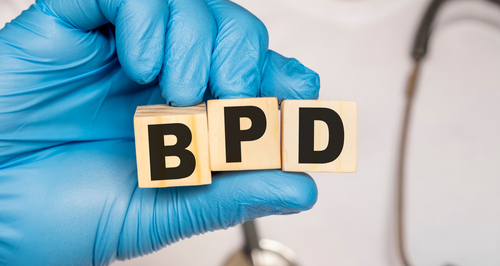
Borderline personality disorder (BPD) is listed in the Diagnostic and Statistical Manual of Mental Disorders, Fifth Edition (DSM-5) as a chronic mental health disorder. It characterized by a pervasive pattern of instability in interpersonal relationships, self-image issues, difficulty managing emotions and behaviors, and an inability to appropriately self-regulate. The symptoms that manifest because of borderline personality disorder often mimic those of other mental health disorders such as histrionic personality disorder, narcissistic personality disorder and bipolar personality disorder. Individuals with borderline personality disorder feel prolonged, intense emotions and are unable to return to a neutral emotional baseline after facing an emotionally charged experience in a timely manner. This can affect all areas of one’s life as the duration it takes an individual with BPD to process, integrate, and recover from emotional challenges is elongated. Further, the symptoms associated with borderline personality disorder can interfere with an individual’s ability to function optimally in his or her daily life.
Impact Of BPD In Pregnancy
To effectively cope with pregnancy and BPD it is helpful to be aware of some of the effects that can occur when these two conditions coincide. Women with borderline personality disorder during pregnancy are faced with additional challenges, as risk of certain complications increase, and BPD symptoms influence various aspects of pregnancy. For example, leading experts assert “Women with borderline personality disorder during pregnancy have been found to be at increased risk of gestational diabetes, premature rupture of the membranes, chorioamnionitis, venous thromboembolism, caesarian section and preterm birth.” It is not uncommon for women with BPD to experience distress when touched. The anticipation of birth is often perceived as traumatic, and women will frequently request early delivery.
What To Do
Pregnancy is a major period of transition in one’s life that is filled with wide ranging emotions. Along with the typical strains and stressors that can accompany pregnancy, individuals that simultaneously struggle with managing symptoms of BPD while pregnant are at increased risk of encountering avoidable challenges. Fortunately, there are a variety of ways to help woman with BPD navigate her pregnancy and manage her symptoms. Consider the following suggestions:
- Minimize the number of people caring for the pregnant woman: leaning on the same person or small group of people during the pregnancy can be helpful for women with BDP, as continuity of caretaker/s provides consistency and familiarity.
- Encourage the pregnant woman to identify and seek practical and/ or emotional support services.
- Urge the pregnant woman to focus on making healthy daily choices (e.g., eating nutritiously, establish good sleeping patterns, etc.).
- Engaging in regular exercise can be advantageous, as it promotes the release of endorphins and increases serotonin levels.
Although for some women with borderline personality disorder, the idea of getting pregnant may seem outlandish or dangerous, it is important to note that with the proper support, a woman with BPD is fully capable of having a perfectly healthy pregnancy.
Disclaimer:
The information above is provided for the use of informational purposes only. The above content is not to be substituted for professional advice, diagnosis, or treatment, as in no way is it intended as an attempt to practice medicine, give specific medical advice, including, without limitation, advice concerning the topic of mental health. As such, please do not use any material provided above to disregard professional advice or delay seeking treatment.


